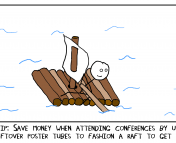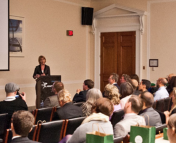This Astrobite was co-written by Zili Shen.
Imagine you are sitting in an audience. You are listening to a speaker who passionately presents their research. The room may be in your department or in a conference hall, and you may be surrounded by classmates, professors, or total strangers. The research talk ends, followed by thunderous applause. The speaker leaves the summary page up and asks the audience, “any questions?” You may think to yourself, “I don’t have any questions. How come people around me almost always have something to say?”
If you’ve experienced this before, know that you are not alone! Many people go through this, especially in the earlier stages of their career as students.
In this Astrobite, we want to make the case that asking good questions is not only a useful skill to have, but also one that can be learned and improved through practice and experience. Being able to ask insightful questions can come in very handy when you attend a conference and want to engage with the speaker. Asking questions is often a good way to initiate conversation with other researchers. If you see a connection to your own research, it can open doors for collaborations. And at the very least, by speaking up, you draw attention from the whole room, and sometimes this is how others might form an impression of you as a scientist.
Listening with the goal of asking a question
It can be very challenging to come up with seemingly insightful questions on the spot, especially if the time to think about and ask a question is limited. We find that often a useful strategy to ease this potentially high-pressure situation is to listen to the speaker’s talk with the explicit goal of coming up with interesting questions. Optionally, you can write down questions as soon as they come up. This alleviates the pressure of spontaneously asking a question, since you can just directly read from your laptop or notebook. In addition, such a “question-oriented” mindset may transform what was previously passive listening to a more active and engaged experience. As a side-effect, this may positively affect your understanding of the presented science.
With this general approach in mind, we wish to walk you through the components of a common research talk and offer concrete tips that can help you formulate a question, even if you are unfamiliar with the topic or were not able to follow big parts of the talk (which is very common).
Introduction: Believe it or not, you can start thinking of questions as soon as the talk starts! The first slide usually has the title of the talk. This is extremely useful because keywords from the title can help you follow the main idea throughout the talk.
The introduction is where the speaker should discuss the broader motivation of the subject. You can assess whether there are meaningful connections to your own field. “I work on X and find your work very interesting. Could your results be applied to X?” This question invites the speaker to think about whether their work is relevant to yours, and it’s a valid inquiry as long as you see genuine potential. This strategy has an additional bonus of introducing yourself and your work to everyone else.
Methods: During the method section, speakers often skip steps involving technical details that may be not worth spending time on during a research talk. Because of this, it can be straightforward to ask for further comments regarding specific steps in their method, or ask them to motivate why their method was chosen to begin with. If they develop a new method or expand on existing methods, ask them what the main improvement is.
Conclusion: Typically, when a talk is over, the speaker has the conclusion/summary slide still visible. This provides an easy opportunity to ask the speaker to elaborate on their conclusions, and future work that their results may entice. This not only shows your interest in the presented work, but also is exciting for the speaker to answer. After all, who doesn’t like to talk about their future plans?
If you were able to follow along with the intro section, see if the speaker delivered on all their promises. For example, if they said the project will be able to find A, B, and C, but the conclusion only mentioned A and B, you can ask them to comment on C. Note that you might want to make sure to be extra friendly/polite with this question – sometimes the reason that they skipped C is because it did not work.
Oftentimes, the speaker will skip one or two slides at the very end due to time constraints — as have many of us too. If that happens, and there is still time to ask questions, you can just ask the speaker to briefly go over what they wanted to talk about on those skipped slides. This will make the speaker happy, since they wanted to talk about that to begin with.
What if people think my question is stupid?
When it comes to the topic of asking questions, the phrase “there are no stupid questions” is often brought up in some form or another. The reality is that while we may consider that statement to be true, there is no guarantee the people who hear our questions think so too.
This leads to a fear we’ve all experienced: unknowingly asking a “trivial” question which we should know the answer to. While this fear can be unfounded (and ideally should be), it nevertheless causes anxiety and can be a real hurdle when it comes to asking questions.
One approach to alleviating this stress is to focus on more specific questions that are directly related to topics you are already familiar with. An example: let’s say the talk is about digitizing historical drawings of sunspots and you know the solar activity cycle is 11 years. You could ask whether that cycle is seen in the drawings, even though you may not be an expert in either history or image processing.
Good practice while asking a question
In addition to being insightful, a good question is also respectful to and appreciative of the speaker, which is why questions are oftentimes accompanied by positive feedback. We also think that — especially for those of you who are junior members of the Astronomy community — it is useful to introduce yourself with your name and institution. This shows confidence and helps people form a connection between you and your publications.
At the next research talk you attend, listen to the questions that are asked at the end. Chances are you will recognize many from our list. We also encourage you to try coming up with your own questions. This doesn’t cost anything – you don’t even have to ask these questions out loud. But with enough practice, one day you’ll be able to confidently ask away!
Astrobite edited by Pratik Gandhi




